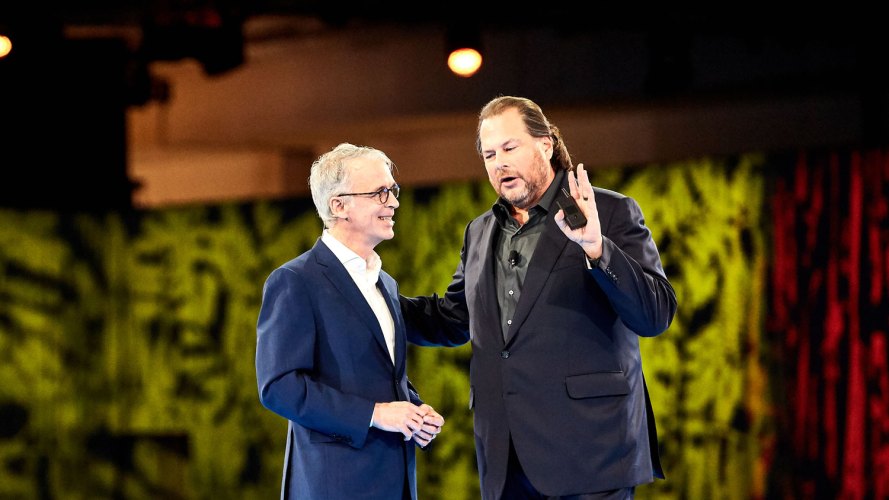Hello Trailblazers! For those in town, welcome to San Francisco, and to those online, we’re glad you can join us. Did you have a good first day at Dreamforce? We kicked off our event today with tons of great content, hands-on activities in the Campground, live music in the Dreamforest, fascinating conversations off and on stage, and lots of learning about the Sustainable Development Goals (SDGs).
In particular, there was a strong focus on artificial intelligence (AI) and technology in the day’s programming. Here’s what we found out today:
1. Trailblazers are more impactful together
We kicked off the day by celebrating Trailblazers creating change for their customers, companies, and communities. These are the leaders and change-makers using Salesforce Customer 360 to transform their company. “That is why we’re here as Trailblazers: to improve the state of the world with trust, customer success, innovation, and equality,” said Chairman and Co-CEO Marc Benioff. As Marc, Co-CEO Keith Block, and fellow Salesforce executives took the stage throughout the morning, the online audience and attendees got a preview of how we can build a connected and smarter Customer 360 together and how we can enable a single source of truth.
Read our opening keynote highlights post for more details.
2. Diversity and soft skills are important in the future workplace
As more organizations move towards digital transformation, they’re realizing the key role that AI plays in this process. It’s the driving force behind changing business models, consumer expectations, and our workforce. Chief Technology Community Officer at the Kapor Center Lili Gangas and Co-Founder and CEO of pymetrics Dr. Frida Polli discussed the potential and pitfalls of AI, the reskilling problem our workforce faces, and the need for more diversity to recognize and prevent bias in AI. Diving into the conversation, Dr. Polli jokingly remarked, “AI is like teenage sex: everyone says they’re doing it, but no one actually knows what it is.” She went on to initiate a discussion on the mind of workers everywhere: AI and jobs. Dr. Polli believes that with growing AI, we need to look more at people for their soft skills and their potential. “Once we find the right balance between historical jobs and new industries — and train people — that’s the way to go.”
The discussion also touched on the importance and need for more diversity in the AI field. “When we have a homogenous group creating technology, if you’re not thinking of the unintended consequences, you’re doing it wrong,” Dr. Polli said addressing the tech industry’s lack of representation. “We’re leaving a lot of undeveloped talent on the table and that’s not good for anybody.” Gangas agreed and brought up the need for underrepresented communities to ask tougher questions of their industries. “To create new systems, we need new founders,” she said. “If someone isn’t asking tough questions, you’re building blindly. I think we can do better and we should.”
3. The potential of 5G is like magic
The excitement surrounding the possibilities and potential of 5G technologies grows every day, but there are equally plenty of questions about how 5G can be rolled out responsibly. Dreamforce welcomed Director General of the GSMA Mats Granryd, Chairman and CEO of KT Corporation Hwang Chang-Gyu, Tech Ambassador of the Danish Ministry of Foreign Affairs Casper Klynge, and moderator Fortune’s Sr. Editor Ellen McGirt to discuss the cascading impact of 5G and how businesses can prepare.
Though 5G may seem like magic, Ellen asks if it is “good magic.” To answer this question, the panel discussed the realistic roll-out of 5G networks, the positive impact of 5G connectivity in remote villages, and the power of lower latency and higher “speed lanes.” As the panel wound down, Klynge, the diplomat, asked the audience to consider new ways of cooperating and new alliances we will need to ensure inclusion of data-security, inclusivity, equality, and sustainability in embracing this new technology on the horizon.
4. Preventing bias in AI is still a challenge for many
The conversations around ethics and responsibility in the use of data, technology, and AI solutions continues to grow. However, there’s still uncertainty in what actionable steps businesses can take to manage bias in AI and ensure organizations are paving the way for digital transformation in an ethical way.
In a fascinating panel, World Economic Forum’s Head of AI and Machine Learning Kay Firth-Butterfield, co-founder & executive chair of Socos Labs Vivienne Ming, and Salesforce’s Architect of Ethical AI Practice Kathy Baxter discussed the state of ethics in AI and shared their insights on what steps all companies can take.
For starters, It’s all about practice. Ethics and AI starts with asking the right questions like, “What needs to be solved” or “Is this something people want, or is it something they need?” “Ethics is a lived experience and making hard decisions when your interests and society’s needs diverge,” Ming advised. Firth-Butterfield agreed with this assessment. “We need to be thinking about the entire process as we design, build, and sell.” This is important because ethics isn’t something that can be learned in a classroom – it’s something that needs to be put into practice.
Similarly, another important benchmark for creating ethical AI is asking yourself if what you build makes people better — is humanity better for it. “Always ask yourself: does this make me a better person, even when I turn it off?” Ming says. Firth-Butterfield explained that we should not think of AI as surpassing our abilities, but about AI helping us overcome what we’re not so good at. “We really need to think about if we really need AI everywhere, and making sure that AI is lifting us up as humans, rather than oppressing us.”
Whew, that’s a wrap for day one! Get a good night’s sleep and stay hydrated because we’re going to crank up the energy again tomorrow for another day of learning and inspiration.
Bonus Insight: Apple CEO Tim Cook believes values enhance innovation
In the same theater where many of Apple’s most revolutionary products have been unveiled, Apple CEO Tim Cook joined Marc Benioff to discuss mobile’s role in the enterprise and the intersection of innovation and values, such as equality, sustainability, and privacy.
Befitting yesterday’s announcement of two new Salesforce apps on iOS and an enhanced Mobile SDK, they discussed the importance of app development for business. “For too many still, mobile is about browsing, email, and messaging,” Cook said. “But arguably, the way you change the business is using mobile apps.” He gave two examples of this, including how Hästens mattress company built a custom iOS app to reduce mattress sale configuration time by 90%.
The conversation pivoted to values and how Cook leads Apple to continue 40 years of innovation while maintaining its focus on values, like sustainability and equality. He openly shared how he came to his personal sense of purpose in his late 30s: “At some point, you recognize the reason we are all here is to help someone else. That is the sole reason. And once you get that in your head, life gets so much simpler.”












